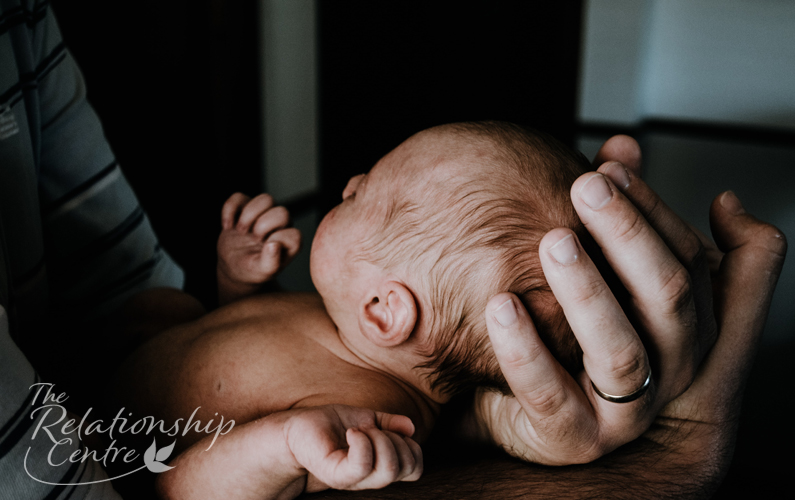Being a parent is hard, and being the parent of an infant is especially hard. The challenges experienced in the first weeks and months after bringing home a new baby are experienced by both mothers and fathers. Women have been experiencing postpartum depression for years, but yet we still struggle to recognize it for the illness it is, and women continue to suffer in silence and shame. This is also the case for men. Postpartum depression can, and does happen to men. Researchers report 10% of fathers experience postpartum depression. And if women who are naturally socialized and viewed to be emotional creatures with an array of emotional experiences do not feel safe to discuss how they are really feeling after having a baby – men take cover behind a protective mask.
One reason men’s depression goes undetected is because men often hide the pain of their depression – from themselves and from others. Another reason is that men with depression don’t always look depressed. As a result of men’s lifelong training in how to “be a man,” men often don’t cry and don’t express sadness or hopelessness when they’re depressed. They’ve been taught that it’s “unmanly” to express feelings, and especially shameful to express feelings that might reveal “weakness.” Among people who are depressed, men are more likely than women to try to rely on themselves and to not seek professional help, so their pain remains hidden.
Researchers are also beginning to discover that men often experience depression in ways that are different from women. Men sometimes cope with symptoms in different ways too.
To better understand men’s depression, it’s useful to look at both the classic symptoms of depression and symptoms that may be specific to men.
Classic Symptoms of Depression
- Depressed, sad mood
- Loss of interest or pleasure
- Significant weight loss or gain
- Trouble sleeping or over-sleeping
- Restless feelings and inability to sit still or slow down
- Fatigue, loss of energy, or tired all the time
- Worthless or guilty feelings
- Impaired concentration and difficulty making decisions
- Recurrent thoughts of death or suicide
To be diagnosed with depression, a person must be experiencing five or more of these symptoms, including either depressed mood or loss of interest, over a two-week period. These symptoms must also be causing significant distress and interfering with the person’s social, work or academic functioning.
One of the problems with this classic diagnosis of depression is that researchers are beginning to recognize that men often don’t acknowledge feelings of sadness, hopelessness, or guilt. Researchers – and clinicians specializing in helping men – are also beginning to recognize symptoms of depression that seem to be unique to men.
Symptoms of Men’s Depression
- Increased anger and conflict with others
- Increased use of alcohol or other drugs
- Frustration or irritability
- Violent behavior
- Losing weight without trying
- Isolation from family and friends
- Being easily stressed
- Impulsiveness and taking risks, like reckless driving and extramarital sex
- Feeling discouraged
- Increases in complaints about physical problems
- Ongoing physical symptoms, like headaches, digestion problems or pain
- Problems with concentration and motivation
- Loss of interest in work, hobbies and sex
- Working constantly
- Misuse of prescription medication
- Increased concerns about productivity and functioning at school or work
- Fatigue
- Conflict in how you feel you should be as a man and how you actually are
- Thoughts of suicide
A man who’s depressed won’t experience all these symptoms. Some men experience only a few of them, while others experience many. And how bad these symptoms get also varies among men – and over time.
What Puts Men at Risk of Postpartum Depression?
Unfortunately, we’re really only beginning to understand Postpartum Depression in men. One of the things we know the least about is what puts men at risk.
Here are some of the things that research suggests may increase a man’s chances of experiencing postpartum depression:
- A lack of good sleep
- Changes in hormones
- Personal history of depression
- Poor relationship with spouse
- Poor relationship with one or both parents
- Relationship stress – with a partner or with in-laws
- Excessive stress about becoming a parent or father
- Nonstandard family (such as being unmarried or a stepfather)
- Poor social functioning
- A lack of support from others
- Economic problems or limited resources
- A sense of being excluded from the connection between mom and baby
One thing we do know is that if a new father’s partner is depressed, there’s a good chance he will be too. Up to half of men whose partners have postpartum depression are depressed themselves.
The tragic news with this story is that if left untreated, postpartum depression in men can result in damaging long term consequences for men, their children, their marriages, their careers and their finances. The good news is that it is very treatable condition.
Depending on the intensity of symptoms and how much they are interfering in daily life, the options for recovery include the self-help strategies of nutrition, exercise, bright light therapy, Omega 3 supplements and learning relaxation techniques. Many individuals will find meeting with a psychotherapist is very helpful in understanding what they are experiencing and learning new ways to cope and manage with the stressors and challenges in their lives. When symptoms are more intense, a combination of psychotherapy with the use of medication may be effective in achieving recovery.
If you are a man, of there is a man in your life, suffering from postpartum depression – getting help is a sign of strength and you and your family deserve for you to be well.
by: Mary Joan Brinson MSW, RSW










